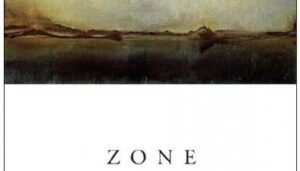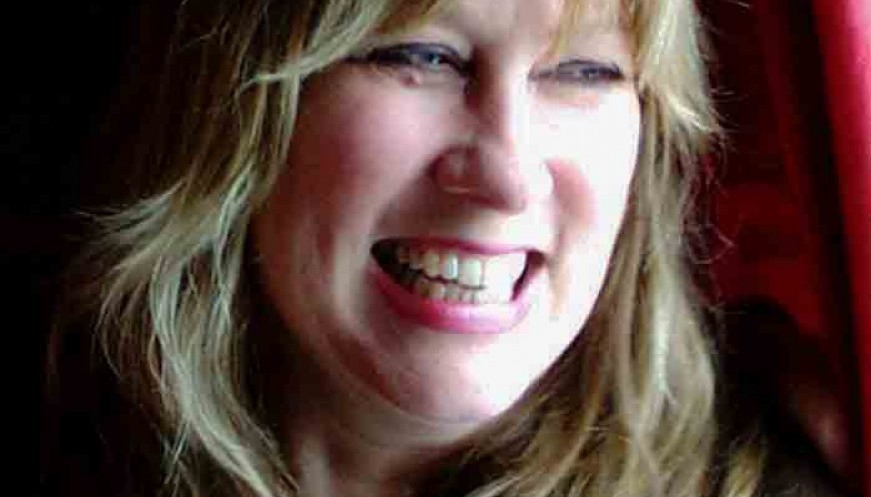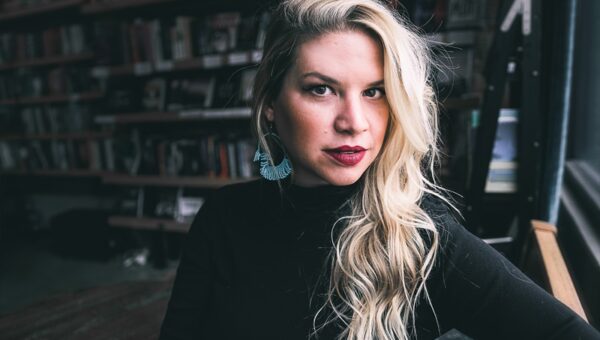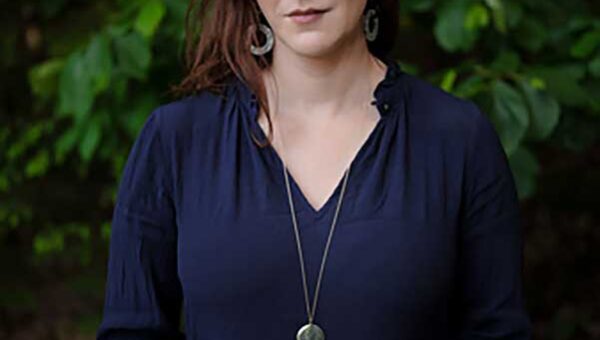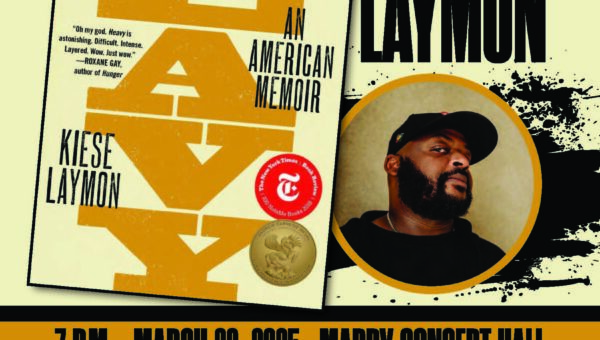Amy Wright: The most wrenching line in the “The Stronger One” for me is “You would not look at the heart of my absence from your life and reveal its darkness…,” because it admits the extent of your irrecoverable loss. It also illuminates the action you are taking via the essay to look into that darkness, proving you may be the stronger one after all. From here my empathy springs—because I sense you would trade this strength to have it be another way. Is writing at such times a means of empowering yourself against what is or has been, or a reward for admitting it?
Marcia Aldrich: I grew up in a family whose motto might have been Deny all. Denial was the modus operandi, and from my earliest memories I have been bent on penetrating the mysteries and subterfuges to get at what was really going on. Peeling back the layers, getting at the truth—these never felt like decisions, more like strategies to survive. Writing has functioned as a corrective, a counterpressure.
Louise Bogan, the modernist poet, said, “The poem is always the last resort,” which gets at your idea that I would have rather been embraced by my father than write this essay. I think of Joan Didion’s Blue Nights. Writing about her dead daughter cannot console or compensate for her loss. But it is all Didion has.
AW: Your essay suggests your father saw strength in your potential to bear, even as a child, your mother’s and his failures, but you leave it up to the reader to decide how much of that label he gives you in praise and manipulation, or weakness. How do you decide how much to include and when to invite readers to make meaning? Or, how did restraint factor into crafting this story?
MA: If the reader’s experience of weighing the material mirrors my own, it pleases me because the essay is animated by just these kinds of questions—did my father really think I was stronger than my mother, and therefore, it was all right to ask me to bear such poor treatment? Or did thinking I was stronger make it easier for him to justify his behavior which served his own needs? Or could both be true—I was stronger but he ignored how much it cost me to be that strong, and how little choice he gave me.
I was the first student up for the first poetry workshop in graduate school and the poem I offered was torn to shreds and the professor David Wagoner led the charge. I went home to my apartment afterwards and called my best friend and told her I was quitting. Of course, I went back and kept writing. When at the end of the semester he asked me if he could publish several of the poems I had written in Poetry Northwest. I asked him why he had been so tough on me, tougher than on anyone else, and he said Because I knew you were strong enough to take it. Did he see something in me that I couldn’t see myself? Or are there ways of being treated that make us strong?
AW: Your essay opens with the resolve to authorize the role and influence of your father in your life, making it apparent that writing has a practicable function as well as an aesthetic one in your life. Who are, or have been, some of your artistic models for that?
MA: I read Marilynne Robinson’s Housekeeping while I was in graduate school at the University of Washington, where she also coincidentally did her graduate degree. In the novel, banishing the father (who dies in a train wreck) authorized an exploration of the female life of the generations of women. No work so sharply made me see how a male character and tradition can marginalize female life. I’ve spent most of my writing life not thinking about my father, instead rehabilitating my mother. It’s ironic, really, that while setting out to rend my family’s fabric of denial, in my own writing I paid small attention to my father. But for a whole lot of reasons, both personal and cultural, I needed to portray my relationship with my mother before I could turn to him.
AW: Your father’s middle name was King, which is perhaps too blatant a metaphor to include in the essay without unduly weighting his character. You solved this issue by using his initial instead. Might you describe another time when the truth would interfere with the telling, and how you handled it?
MA: You raise an interesting question—why didn’t I play upon his middle name? I could have done more with a King who has to beg his wife for admittance to his own kingdom. Though I can’t claim the fidelity of a Cordelia, I have always felt a parallel between the family layout in King Lear and my own position as the third daughter. Of the three, I was the one who attempted the truer relationship with my father and bore the costs of that effort. In the essay I was more interested in exploring our lack of easy closeness, how he framed our relationship as a business correspondence. I couldn’t call him “Daddy”—it didn’t seem fitting to call him that. “King” was my father’s mother’s maiden name. You rightly say that it’s a weighty truth, and in the essay I am selecting a different focus and balance.
In Companion to an Untold Story, which is about the suicide of a friend, I made a commitment to veracity, because the profound subject demanded it. The Companion is about trying to imagine my way into his heart and mind, in an effort to understand his act. I wanted to picture the scene of death, which took place in his home. But he had moved since I last visited him, so I described the death in a prior apartment that I had seen, collapsing the two scenes. In this case, literal truth was less compelling than the best way of telling.
AW: When I was young, a small sign hung on the office wall while the dental hygienist’s hands widened my mouth to floss. It read: “Blessed are those who converse with the hopelessly mute, for they shall be called dentists.” Considering your essay is constructed as a one-sided conversation, will you speak to that art?
MA: As a child silence was imposed upon me. It wasn’t something I chose. I wanted to have a voice, to speak, and to be heard. Even when I was allowed to speak, my father claimed he couldn’t hear me—that my voice was too soft. Eventually I became a silent person with my parents, almost refusing to engage, which also enraged them. They didn’t want to hear me, but they did want me to respond when they spoke to me. Naturally I became a writer.
Different relationships create different dynamics, and it’s not always clear who is in control. In “The Stronger One” I hope these questions are rich and that the form embodies them. After a lifetime of listening to my father, not being heard by him, I hope it makes emotional sense that I address this essay as an apostrophe to him.
AW: It does make sense, yes. Perhaps doing so also gave you insight into the reasons for and risks of making the personal public?
MA: The reasons for are compulsion, revelation, a limitless subject matter, honesty, beauty. The risks of are discord with the people who were there, self-aggrandizement, sowing boredom.
AW: Did writing this essay prompt any additional questions or stories about your father you feel the need to explore?
MA: In writing “The Stronger One” I revisited earlier pieces of writing in which my father figured, thinking about material I didn’t consider or develop. There was so much I omitted or passed over, and yet he’s a very compelling character, if undeveloped in my work. In my writing, he’s difficult, sometimes ridiculous, but warmer and more human than my mother. I can now see how much I identified with him, how much I was like him—for good or bad. It has become clear how much I owe him. It is probably because of my father that I became a girl with ambitions and yearnings that led me into writing. Because he at times treated me like an only son, I had opportunities early on in life. I’m writing a memoir, Haze, that focuses on a crucial period of my education, from the end of high school through college, and in the process of composition I encounter my father much more than I did in my earlier writing.
AW: Your writing is fearless in offering readers (and yourself!) access to some unflattering truths. One might assume such openness is easier for some than others, but I wonder if you too have to bolster your courage, and how?
MA: It should be said that my father died a few years ago, and I would not have written this essay while he was alive. His death allowed me the necessary distance from which to admit my resemblance to him. I am my father’s daughter, and now I can look at what that kinship has meant and means. When my father was alive, my feelings were too volatile. Rereading my essay, I am struck by how calm it is, how precise.
All art that is worth anything is connected to courage and truthfulness, to cracking illusions, and to emotional stamina. But much is explicitly made of the personal risk-taking of creative nonfiction and memoir. We talk so much about the public exposure of private matters and the courage required to go forward. Sometimes this leads to an overvaluation, I think, of shocking revelations, with insufficient attention directed to the art of telling and the larger story in which exposure has a part. And then, we nonfictionalizers are sometimes disparaged because our plots seem so personal, as if poets and fiction writers don’t find their roots in the autobiographical. There are certainly times when I have envied the cover granted to poets, because the scrutiny that operates on the personal essay is burdensome.
AW: As a teacher of writing, I often find myself redirecting scrutiny of the author’s character toward the craft. Precisely because the best personal essays are so well constructed, it is hard to imagine they could be any other way. It seems inevitable that your father’s telephone “Ring, ring” becomes a keepsake akin to your mother’s amethyst, because the narrative has prepared us to hold onto it at the end, even as it fades in our ear, an echo of the speaker’s loss. But you might have led us toward another image or aspect of the relationship. Will you talk about how you found your way to this one?
MA: The thread about telephones functions as a connective tissue and came to me like a gift. From the beginning it was just there. But, of course, that isn’t true. When I stop to think about it, I remember how my thinking began some time before I actually wrote this essay. I was using the magazine Defunct as a basis of a writing prompt in one of my classes. We were making a list of all the things we could name that we thought fit the definition of defunct. The landline was identified as one such item and it got me thinking about my first experience of hearing about someone’s death through a call in the middle of the night and how my father was at the heart of the story. The whole experience is defunct now—there is no central phone in the house like there was in my story, nothing for the whole family to hear and then gather around. I heard about my father’s death in the middle of the night when my sister called, but the call came on my cell phone for I no longer used a landline. These two experiences were connected in my mind—like bookends– and I saw that I could bring some symmetry to the essay. And then my talking to my father over the phone was always troubled and embodied so much of what was wrong between us. Instead of feeling connected by the telephone, I felt the phone exposed our disconnection, how our conversations were one-sided.
All of the material arises directly from lived experience and shows once again how rich the detail from our own lives can be. It felt like a gift because it almost seemed to shape itself for the page. The irony was perfect, the final turn of the screw that when I finally had the power to delete my father, I couldn’t do it.
